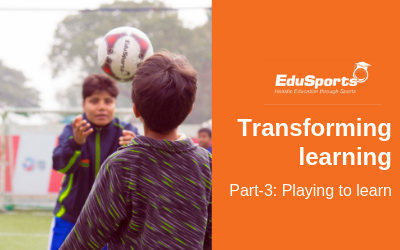“To succeed is to have failed” – learning from failures

Transforming learning: Part-1
What is play?
Imagine a rock-climber inching her way up a huge, ominous looking rock – completely absorbed in the intense effort to climb, or a runner drawing upon her every ounce of energy to finish the last few laps, or a bunch of kids playing tag in a public park – completely oblivious of the honking traffic or any other external noise.
What is common in all these scenarios? Of course, it is evident that they all are deeply engaged in a game or sport they have chosen out of their own free will- an activity, ostensibly with no material gain, which is worth doing for its own sake.
George Mallory, a fabled mountaineer who died while attempting to scale Mt. Everest almost two decades before Edmund Hillary and Tenzing Norgay officially accomplished the feat, was once asked: ‘Why do you want to climb the Everest?’, he’s supposed to have replied – ‘because it is there.’
Sport or play at its most fundamental level has a unique attribute – the players participate mostly for the sake of playing, without any notion of material gains or productivity. In fact, sometimes, it might seem like a sheer waste of time and energy.
So, what has this got to do with schools and learning? A lot.
It should also not come as a surprise why the schools – our primary learning environments – are also key agents of promoting inactivity (evident by the ever-reducing recess time and number of sports periods in school time-tables) – for the simple reason that ‘playing’ for its own sake, does not seem very productive or outcome oriented.
Now, don’t get me wrong. Schools do promote sports and physical activity – but mainly in the form of organized or competitive varieties of sport – which offers but a small subset of ‘talented’ children an opportunity to win something material (a medal, or trophy), something to show for the investment put in terms of time and effort. Now, identifying and developing sporting talent from schools or grass-root sports is an important and critical pursuit by itself – but not the focus of this piece (which is learning).
The fact is that play is central to human experience – right from the time we are babies. We are intrinsically wired to play.
In this series of articles on ‘transforming learning’, I would like to offer some arguments – how play, in and of itself – can have a huge impact on learning.
For starters, let’s take a quick look at the ‘psychology’ behind play viz. what is play, and why do we play?
Play is characterized by the following two attributes:
- Play is something that is done completely out of one’s own will or volition – which differentiates it from what we call ‘work’ or ‘study.’
- Play comes with its own set of ‘rules’ and an ‘arena’ (independent place earmarked for playing) – created by or agreed between the players. This construct also enables the participants to operate in an ‘alternate reality’ or a ‘make-believe’ land – which is fundamentally different from what we call ‘real life.’
And, why do we play? There are many theories offered by leading psychologists and scholars as to why we play?
Given below are two key ideas that agree with our experience as well:
- The ongoing sense of control and accomplishment – one gets while playing – is immensely liberating and pleasurable
- Play or sport gives an individual the opportunity to connect or bond with others and the environment – to be a part of a social context is often deeply satisfying.
Having established that, let’s do a quick thought experiment. Consider the reference of ‘kids playing tag in the public park’ at the beginning of the article. Does ‘game of tag’ satisfy all four conditions of ‘play’ outlined above?
Now, let’s test if the converse is true as well. Think of a sub-par ‘play’ or ‘sports’ session in a school or outside. Can you spot if any one or more conditions from the above missing?
The question now arises that how can we use these attributes of ‘play’ to improve educational outcomes in schools? This will be the focus of my upcoming articles – so stay tuned!

Author
Parminder Gill
(Co-founder and Head of Business)






